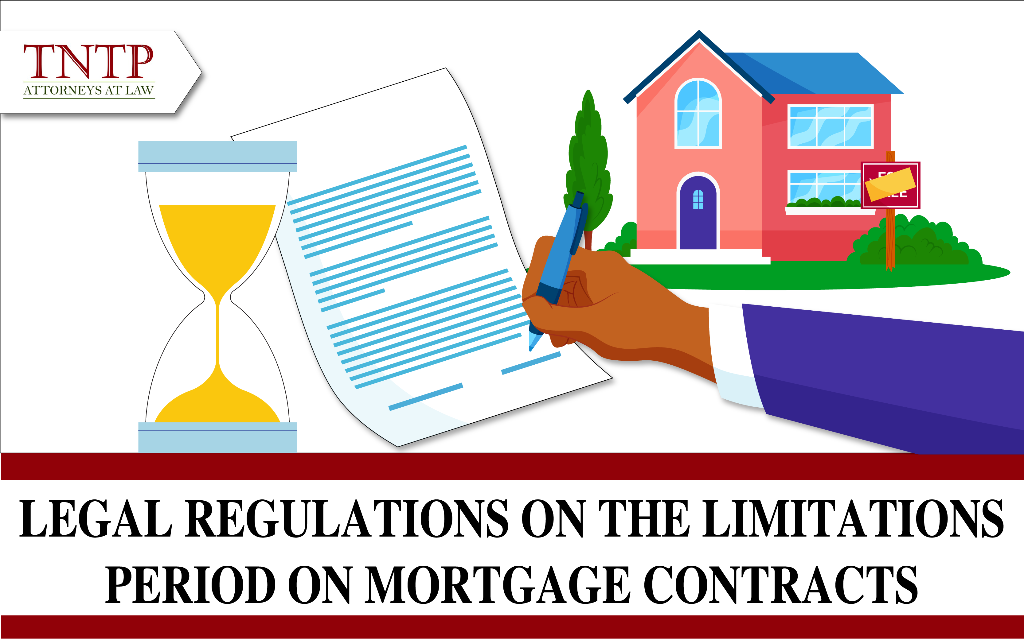Legal regulations on the limitations period on mortgage contracts

The limitations period is the period during which a party has the right to file a lawsuit to request the court or arbitration to resolve a civil case to protect the infringed legal rights and interests; if this period expires, the right to sue is lost. In the article below, TNTP will present some issues related to the limitations period on a mortgage contract for the parties to refer to when initiating legal proceedings at the competent dispute settlement body.
1. On the dependency of the limitations period on a mortgage contract
Since a mortgage contract is essentially an ancillary contract, a component of the main contract – the loan contract, the filing of a lawsuit in general and the limitations period to resolve disputes, in particular, are calculated according to the limitations period of the main contract.
2. On the limitations period
According to Article 429 of the 2015 Civil Code, the limitations period to request the court to resolve contract disputes in general, and mortgage contract disputes in particular, is 03 years from the date the entitled person knew or should have known that their legal rights and interests were infringed. However, the reclamation of assets in a loan contract does not apply to the limitations period because it falls under the category of “requesting the protection of ownership rights.” The lender no longer owns the loaned asset from the moment the borrower receives it according to the following regulation: “A borrower shall become the owner of borrowed property from the time of delivery of the property.” Therefore, when the lender sues to require the borrower to fulfil the payment obligation, the principal debt amount is not subject to the limitations period, but the limitations period applies to the interest debt and other related costs arising from the loan contract.
The 2015 Civil Code stipulates “limitations period to request the court to resolve contract disputes”, but does not mention arbitration. Meanwhile, the 2015 Civil Code stipulates “If a particular civil right is violated or is under a dispute, the protection of such right shall be implemented as prescribed in procedural law at the court or arbitration.” According to Article 33 of the 2010 Law on Commercial Arbitration, except for other provisions in specialized laws, the limitations period under arbitration procedures is 02 years from the time the legal rights and interests are infringed.
3. On the periods excluded from the limitations period
The 2015 Civil Code stipulates periods excluded from prescriptive periods for initiating legal action for civil cases and from prescriptive periods for requesting resolution of civil cases, including:
• The period during which a force majeure event or an objective obstacle occurs, preventing the entitled person from filing a lawsuit or making a request within the limitations period.
• The period during which there is no representative in cases where the entitled person is a minor, has lost civil act capacity, has difficulty in perception and behaviour control, or has limited civil act capacity. The minor, a person who has lost civil act capacity, a person with difficulty in perception and behaviour control, or a person with limited civil act capacity does not have another representative to replace in the following cases: the representative dies if an individual, or ceases to exist if a legal entity; the representative, for legitimate reasons, cannot continue to represent.
4. On the re-commencement of the limitations period
When the limitations period expires, the limitations period starts can re-commence in the following cases:
• The obligated party has acknowledged part or all of their obligation to the claimant;
• The obligated party acknowledges or fulfils part of their obligation to the claimant;
• The parties have reconciled.
5. On the acceptance of cases of the Court
Previously, the court would not accept or would return the case if the limitations period had expired. However, according to the 2015 Civil Procedure Code, in case the limitations period expires, the court still has to accept the case and only applies the limitations period rules upon the request of at least one party.
The above is the article by TNTP on “Legal regulations on the limitations period on mortgage contracts”. If you have any issues to discuss, please contact TNTP for timely support.
Best regards,


